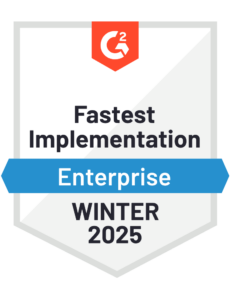Growing Complexity: What Your Office of Finance Should Know
Blog post
Share
In an increasingly complex world, finance leaders are being counted on to meet their organization’s demands for efficiency, innovation, and business intelligence. It’s a tall order to move beyond the traditional roles of accounting and financial reporting to become strategic advisers who support the growth of the company. In order to achieve these lofty goals, you’ll need to make sense of the unique complexities and challenges that your organization faces so that your team can tackle them head on.
Managing complexity effectively can lead to major benefits, including:
- Higher returns
- Improved customer satisfaction
- Improved employee satisfaction
The more you understand the changes around you, the more you can embrace and manage them. This blog outlines the current challenges that many organizations are facing.
The Digital Revolution
We are living in a period of extraordinary progress. Innovation, in all areas of life, from the economy to sciences to communications, comes rapid fire. Consider that just 30 years ago, people generally communicated via landlines, fax machines, photocopied memos, and physical mail. Digital technology has not just transformed communications, it has altered our entire way of life.
The constant introduction of disruptive technology creates numerous organizational challenges, and adapting to technological changes can be especially challenging for established companies and industries.
The retail industry is a perfect example. With the rising popularity of third-party marketplaces and delivery services, plus same-day pickup of online orders and mobile checkout, e-commerce has completely upended the way retail companies and supply chains work. In fact, industry experts predict that the e-commerce market will expand to over $8.1 trillion by 2026. The quickly evolving environment has resulted in acquisitions and restructuring to meet consumption patterns as well as investors’ demand for growth.
But staying at the cutting-edge is not easy—new technology and advancements in automation are being developed every day. Keeping up can be overwhelming!
Information Overload
The digital revolution leads to another cause of complexity: information management. The amount of data that organizations have at their fingertips today is massive, from both internal and external sources. While this can be highly beneficial, organizing large volumes of data can present challenges.
To stay competitive, businesses have to understand how to apply data-driven methodologies to improve performance across departments. But data analytics is no longer confined to spreadsheets, and building a data-driven culture takes time and investment.
The rise in data complexity presents challenges to IT systems as well. Businesses are discovering that they have incompatible or inadequate systems that need upgrades to extract and structure data before any analysis can be done.
Since most workers are not data analysts, the complexity of data very quickly exceeds their ability to justify a decision, which is why they tend to revert to the way they’ve always done things. In the context of finance, that means outmoded management tools and techniques, like traditional spreadsheets.
Workforce Evolution
The number of practicing accountants and auditors has been on a steady decline for the past 10 years, with a massive drop in accounting graduates (17% over the past 10 years) and a fall in the number of individuals taking the CPA exam. A smaller talent pool leaves organizations with less options, struggling to find and retain top talent.
Accounting professionals today aren’t interested in serving as bots, performing menial and tedious tasks. Analyzing exceptions and exploring data for trends and insights are the kind of assignments that need a human touch, and they’re often the engaging work that made accountants choose their professions in the first place. Organizations that want to remain a competitive option in the job market need to find ways to lessen the mind-numbing (but necessary) tasks and make the work more engaging.
Compliance Risk
Evolving standards and regulations are a constant source of change and a constant source of pain. CFOs often cite regulations and the cost of compliance among their top concerns, with non-tax regulations being listed as the most common cause of complexity in one KPMG survey.
There is more pressure than ever to ensure compliance is being effectively managed, creating all sorts of organizational complexity, including:
- Effectively implementing and enforcing regulatory controls as well as monitoring future changes
- Ensuring employees are aware of and abiding by their compliance responsibilities
- Reviewing compliance breaches and taking steps to make sure they are not repeated
- Maintaining growth while remaining fully compliant
Another example of compliance risk is process failure. Manual methods can easily lead to errors. In the accounting and finance context, not effectively managing the financial close can lead to reporting errors that breach your duty to investors.
Multinational companies have added concerns because there are often regulatory conflicts between jurisdictions. Several industries, including healthcare and financial services, have their own maze of regulatory requirements to sort through.
Managing Complexity
Organizations of all sizes are operating in an increasingly global, complex, and fast-paced environment, which presents challenges to the performance of the accounting and finance function. Accountants often must process and verify transactions that span borders and involve multiple currencies. Modern businesses also are generating massive amounts of transaction data, including transactions via third-party services.
As businesses grow, the level of complexity only increases. They enter new markets, expand their product lines, and find new customers. Along the way, organizations add resources, layers of management, processes, and infrastructure to support that growth. Each of these decisions can also increase barriers to getting things done.
The office of finance has to respond to these forces of change and also play a key role in ensuring organizations continue to thrive. To reduce complexity, the office of finance can:
- Eliminate Inefficiency: Across many key processes, such as the financial close, automation and process improvement can reduce costs and improve productivity
- Add Value: Move beyond traditional accounting and compliance and deliver business insight
- Invest in Skills: Build out financial planning and analysis so the team can be leaders and not merely reporters
In the pursuit of excellence, you can move beyond traditional accounting and finance functions and become a valued business partner.






